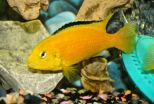(Press-News.org) Gland, Switzerland – With only about one-sixth of the original coral cover left, most Caribbean coral reefs may disappear in the next 20 years, primarily due to the loss of grazers in the region, according to the latest report by the Global Coral Reef Monitoring Network (GCRMN), the International Union for Conservation of Nature (IUCN) and the United Nations Environment Programme (UNEP).
The report, Status and Trends of Caribbean Coral Reefs: 1970-2012, is the most detailed and comprehensive study of its kind published to date – the result of the work of 90 experts over the course of three years. It contains the analysis of more than 35,000 surveys conducted at 90 Caribbean locations since 1970, including studies of corals, seaweeds, grazing sea urchins and fish.
The results show that the Caribbean corals have declined by more than 50% since the 1970s. But according to the authors, restoring parrotfish populations and improving other management strategies, such as protection from overfishing and excessive coastal pollution, could help the reefs recover and make them more resilient to future climate change impacts.
"The rate at which the Caribbean corals have been declining is truly alarming," says Carl Gustaf Lundin, Director of IUCN's Global Marine and Polar Programme. "But this study brings some very encouraging news: the fate of Caribbean corals is not beyond our control and there are some very concrete steps that we can take to help them recover."
Climate change has long been thought to be the main culprit in coral degradation. While it does pose a serious threat by making oceans more acidic and causing coral bleaching, the report shows that the loss of parrotfish and sea urchin – the area's two main grazers – has, in fact, been the key driver of coral decline in the region. An unidentified disease led to a mass mortality of the sea urchin in 1983 and extreme fishing throughout the 20th century has brought the parrotfish population to the brink of extinction in some regions. The loss of these species breaks the delicate balance of coral ecosystems and allows algae, on which they feed, to smother the reefs.
Reefs protected from overfishing, as well as other threats such as excessive coastal pollution, tourism and coastal development, are more resilient to pressures from climate change, according to the authors.
"Even if we could somehow make climate change disappear tomorrow, these reefs would continue their decline," says Jeremy Jackson, lead author of the report and IUCN's senior advisor on coral reefs. "We must immediately address the grazing problem for the reefs to stand any chance of surviving future climate shifts."
The report also shows that some of the healthiest Caribbean coral reefs are those that harbour vigorous populations of grazing parrotfish. These include the U.S. Flower Garden Banks National Marine Sanctuary in the northern Gulf of Mexico, Bermuda and Bonaire, all of which have restricted or banned fishing practices that harm parrotfish, such as fish traps and spearfishing. Other countries are following suit.
"Barbuda is about to ban all catches of parrotfish and grazing sea urchins, and set aside one-third of its coastal waters as marine reserves," says Ayana Johnson of the Waitt Institute's Blue Halo Initiative which is collaborating with Barbuda in the development of its new management plan. "This is the kind of aggressive management that needs to be replicated regionally if we are going to increase the resilience of Caribbean reefs."
Reefs where parrotfish are not protected have suffered tragic declines, including Jamaica, the entire Florida Reef Tract from Miami to Key West, and the U.S. Virgin Islands.
The Caribbean is home to 9% of the world's coral reefs, which are one of the most diverse ecosystems on the planet. Caribbean reefs, spanning a total of 38 countries, are vital to the region's economy. They generate more than US$ 3 billion annually from tourism and fisheries and over a hundred times more in other goods and services, on which more than 43 million people depend.
"The decline in corals started long before climate change began to affect reefs," says Terry Hughes, author of the 1994 study that predicted the current problems due to parrotfish removal. "This report confirms that vigorous populations of grazing parrotfish are a common attribute of the healthiest Caribbean coral reefs. These 'resilient reefs' have strong local protections that are strictly enforced and double or triple the average coral cover of the 14% seen throughout the Caribbean."
"Parrotfish populations are crucial to the very survival of coral reefs, but are being destroyed despite their enormous ecological and economic value" says Jerker Tamelander, head of the UNEP coral reef unit. "We urge Caribbean nations to work together and respond to the Caribbean coral reef crisis through joint actions, including protecting parrotfish under the Protocol on specially protected areas and wildlife of the Cartagena Convention."
INFORMATION:
Notes to editors
The report Status and Trends of Caribbean Coral Reefs: 1970-2012 was published by the GCRMN and IUCN, with the support from The International Coral Reef Initiative (ICRI), the ARC Centre of Excellence for Coral Reef Studies, United States State Department, United Nations Environment Programme (UNEP), Ministry of Economic Affairs of the Netherlands, Summit Foundation, McQuown Foundation and the Smithsonian Tropical Research Institute.
Key findings of the report:
There has been a dramatic decline in Caribbean corals of more than 50% since the 1970s. The decline is not uniform and correlates only weakly with local extreme heating events, instead being mainly attributed to the severity of local stressors, in particular tourism, overfishing and pollution.
Whilst climate change has badly affected Caribbean corals and continues to be a major threat, well-managed reefs have bounced back suggesting that climate change is not the main determinant of current Caribbean coral health and that good management practices can save larger areas of reef if tough choices are made.
Loss of the two main grazers, parrotfish and sea urchin, has been a key driver of coral decline in the region as it breaks the delicate balance of coral ecosystems and allows algae to smother reefs
The massive outbreak of coral diseases and mass die-off of sea urchin close to the Panama Canal suggest that the order-of-magnitude increase in bulk shipping in the 1960s and 1970s has introduced pathogens and invasive species that have since spread in the Caribbean.
Recommendations made in the report:
Adopt conservation and fisheries management strategies that lead to the restoration of parrotfish populations and so restore the balance between algae and coral that characterises healthy coral reefs;
Maximise the effect of those management strategies by incorporating necessary resources for outreach, compliance, enforcement and the examination of alternative livelihoods for those that may be affected by restrictions on the take of parrotfish;
Consider listing the parrotfish in the Annex II and III of the SPAW Protocol (The Protocol Concerning Specially Protected Areas and Wildlife) in addition to highlighting the issue of reef herbivory in relevant Caribbean fisheries fora;
Engage with indigenous and local communities and other stakeholders to communicate the benefits of such strategies for coral reef ecosystems, the replenishment of fisheries stocks and communities' economy.
Executive Summary and full report, "Status and Trends of Caribbean Coral Reefs: 1970-2012": http://bit.ly/1puLHlp
High resolution photos: http://bit.ly/1qLdYmc
An 8-minute video, "From Despair to Repair," about the report's implications: http://www.iucn.org/?16050
About GCRMN
The Global Coral Reef Monitoring Network (GCRMN) was established in 1994 to support the global call for action of the International Coral Reef Initiative (ICRI) to commit to increasing research and monitoring of coral reefs in order to provide the data needed to inform policy makers to sustain coral reefs and to strengthen management. Today, the GCRMN works through a global network of stakeholders to support the management and conservation of coral reefs. The work of GCRMN focuses on increasing the scientific understanding of the status and trends of coral reef ecosystems worldwide by making reef monitoring data publicly available, linking people and existing organizations, improving the communication among GCRMN members by providing information on network activities in order to strengthen the existing capacity across regions to manage coral reefs more efficiently while adapting to the effects of climate change.
http://gcrmn.org/
About IUCN
IUCN, International Union for Conservation of Nature, helps the world find pragmatic solutions to our most pressing environment and development challenges. IUCN's work focuses on valuing and conserving nature, ensuring effective and equitable governance of its use, and deploying nature-based solutions to global challenges in climate, food and development. IUCN supports scientific research, manages field projects all over the world, and brings governments, NGOs, the UN and companies together to develop policy, laws and best practice. IUCN is the world's oldest and largest global environmental organization, with more than 1,200 government and NGO Members and almost 11,000 volunteer experts in some 160 countries. IUCN's work is supported by over 1,000 staff in 45 offices and hundreds of partners in public, NGO and private sectors around the world.
http://www.iucn.org
About ICRI
The International Coral Reef Initiative (ICRI) is a unique environmental partnership that brings together stakeholders with the objective of sustainable use and conservation of coral reefs for future generations. The many partners, including governments, international environmental and development agencies, scientific associations, the private sector and NGOs, are dedicated to designing the best strategies to conserve the world's coral reef resources.
http://www.icriforum.org/
About ARC Centre of Excellence for Coral Reef Studies
ARC Centre of Excellence for Coral Reef Studies was established in 2005 and is recognised as one of the world's premiere coral reef research organisations. Headquartered at James Cook University, the ARC Centre partnership includes the Australian National University, the University of Queensland and the University of Western Australia and leading international research centres. The ARC Centre of Excellence currently encompasses >250 researchers and graduate students, with ongoing research projects in 30 countries. The vision of the Centre is to provide the scientific knowledge necessary for understanding the world's coral reefs and their interaction with people in order to foster their sustainable use, secure the benefits they provide to tropical societies and economies, and enhance the effectiveness of coral reef management world-wide.
http://www.coralcoe.org.au/
About UNEP:
The United Nations Environment Programme (UNEP), established in 1972, is the voice for the environment within the United Nations system. UNEP acts as a catalyst, advocate, educator and facilitator to promote the wise use and sustainable development of the global environment. To accomplish this, UNEP works with a wide range of partners, including United Nations entities, international organizations, national governments, non-governmental organizations, the private sector and civil society.
http://www.unep.org
From despair to repair: Dramatic decline of Caribbean corals can be reversed
If we stop killing parrotfish we can bring back Caribbean coral reefs
2014-07-02
ELSE PRESS RELEASES FROM THIS DATE:
License plate readers are important police tool, but hurdles remain, study finds
2014-07-02
Systems that automatically read automobile license plates have the potential to save police investigative time and increase safety, but law enforcement officials must address issues related to staffing, compatibility and privacy before the technology can reach its full potential, according to a new RAND Corporation report.
As part of efforts to promote innovation in law enforcement, many of the first generation license plate reader systems were purchased with federal and state grants. As these funding streams can be inconsistent, law enforcement agencies are – or will ...
A 'magic moment' for unwed parents
2014-07-02
DURHAM, N.C. -- If unwed parents are going to get married, the best window of opportunity for that union seems to be before their child turns 3, says a new study from Duke University.
But patterns vary greatly by race, with more African-American mothers marrying much later than mothers of other races or ethnicities.
Federal policies have often presumed that unmarried parents will be most receptive to marriage right after a baby's birth, a period that has been dubbed the "magic moment." The new study is the first to test that assumption, said author Christina Gibson-Davis. ...
How do ants get around? Ultra-sensitive machines measure their every step…
2014-07-02
How do ants manage to move so nimbly whilst coordinating three pairs of legs and a behind that weighs up to 60% of their body mass? German scientists have recently developed a device that may reveal the answer.
Measuring the forces generated by single limbs is vital to understanding the energetics of animal locomotion. However, with very small animals such as insects, this becomes problematic. Dr Reinhardt (Friedrich-Schiller University) used an elastic polycarbonate material to produce a miniature force plate. Springs arranged at right angles to each other enabled forces ...
Locusts harness the sun to get their optimum diet
2014-07-02
If you are a locust, the most nutritious plant to eat depends on the ambient temperature. Scientists at the University of Sydney, Australia, have discovered that locusts choose their food and then where they digest it according to how hot it is.
Dr Fiona Clissold, who led the study, explains why temperature has such a large influence on insect diets. "Whilst an insect's metabolic rate increases exponentially with temperature, the rate at which locusts absorb protein and carbohydrate from different plants does not increase in step with temperature. As a result, nutrient ...
Smarter than you think: Fish can remember where they were fed 12 days later
2014-07-02
It is popularly believed that fish have a memory span of only 30 seconds. Canadian scientists, however, have demonstrated that this is far from true – in fact, fish can remember context and associations up to twelve days later.
The researchers studied African Cichlids (Labidochromis caeruleus), a popular aquarium species. These fish demonstrate many complex behaviours, including aggression, causing the scientists to predict that they could be capable of advanced memory tasks. Each fish was trained to enter a particular zone of the aquarium to receive a food reward, with ...
A sheep's early life experiences can shape behavior in later life
2014-07-02
New research has found that a sheep's experiences soon after birth can shape its later behaviour and also that of its offspring.
The study led by academics from the University of Bristol's School of Veterinary Sciences and published in the Royal Society journal Biology Letters investigated whether early-life experiences can alter behavioural responses to a naturally painful event in adulthood – giving birth – and also affect behaviour of the next generation.
The period following birth can be a challenging time for young lambs. They are usually tail-docked without analgesia ...
Patients with severe ME have little or no access to specialist treatment services
2014-07-02
One in three severely affected adults with ME in England have no access to local specialist services, new research has shown.
Published in the British Medical Journal Open, the research by the University of Southampton reveals NICE guidelines, which say severely affected patients with ME, otherwise known as chronic fatigue syndrome (CFS), should have access to specialist care, are not being met by many NHS Trusts across England.
Over a third of specialist adult ME/CFS services in the NHS provide no service to severely affected patients, and a further 12 per cent of ...
Nature of solids and liquids explored through new pitch drop experiment
2014-07-02
VIDEO:
The movie clip shows the bitumen flow from the top camera view, and corresponds to approximately 24 days of real time.
Click here for more information.
Physicists at Queen Mary University of London have set up a new pitch drop experiment for students to explore the difference between solid and liquids.
Known as the 'world's longest experiment', the set up at the University of Queensland was famous for taking ten years for a drop of pitch – a thick, black, sticky ...
New study involving CU-Boulder tells the tale of a kangaroo's tail
2014-07-02
VIDEO:
This video is an analysis of video of kangaroos walking has helped scientists discover how important their tails are during locomotion.
Click here for more information.
Kangaroos may be nature's best hoppers. But when they are grazing on all fours, which is most of the time, their tail becomes a powerful fifth leg, says a new study.
Involving researchers at the University of Colorado Boulder, Simon Fraser University in Burnaby, Canada, and the University of New ...
The Lancet: Nearly 80 percent of US deaths in the first three decades of life are due to unintentional injury or violence
2014-07-02
A new report on unintentional injury and violence in the United States, published in The Lancet as part of a new Series, The health of Americans [1], has found that prevention strategies across society show a great deal of promise in preventing unintended deaths and injuries.
According to the report, by CDC researchers from Atlanta, USA, more Americans between the ages of one and 30 die from injury than from any other cause. Every year, nearly 180 000 people in the USA die from preventable causes such as automobile crashes, drowning, firearm-related injuries, falls, ...
LAST 30 PRESS RELEASES:
Unraveling the mystery of why some cancer treatments stop working
From polls to public policy: how artificial intelligence is distorting online research
Climate policy must consider cross-border pollution “exchanges” to address inequality and achieve health benefits, research finds
What drives a mysterious sodium pump?
Study reveals new cellular mechanisms that allow the most common chronic cardiac arrhythmia to persist in the heart
Scientists discover new gatekeeper cell in the brain
High blood pressure: trained laypeople improve healthcare in rural Africa
Pitt research reveals protective key that may curb insulin-resistance and prevent diabetes
Queen Mary research results in changes to NHS guidelines
Sleep‑aligned fasting improves key heart and blood‑sugar markers
Releasing pollack at depth could benefit their long-term survival, study suggests
Addictive digital habits in early adolescence linked to mental health struggles, study finds
As tropical fish move north, UT San Antonio researcher tracks climate threats to Texas waterways
Rich medieval Danes bought graves ‘closer to God’ despite leprosy stigma, archaeologists find
Brexpiprazole as an adjunct therapy for cognitive dysfunction in schizophrenia
Applications of endovascular brain–computer interface in patients with Alzheimer's disease
Path Planning Transformers supervised by IRRT*-RRMS for multi-mobile robots
Nurses can deliver hospital care just as well as doctors
From surface to depth: 3D imaging traces vascular amyloid spread in the human brain
Breathing tube insertion before hospital admission for major trauma saves lives
Unseen planet or brown dwarf may have hidden 'rare' fading star
Study: Discontinuing antidepressants in pregnancy nearly doubles risk of mental health emergencies
Bipartisan members of congress relaunch Congressional Peripheral Artery Disease (PAD) Caucus with event that brings together lawmakers, medical experts, and patient advocates to address critical gap i
Antibody-drug conjugate achieves high response rates as frontline treatment in aggressive, rare blood cancer
Retina-inspired cascaded van der Waals heterostructures for photoelectric-ion neuromorphic computing
Seashells and coconut char: A coastal recipe for super-compost
Feeding biochar to cattle may help lock carbon in soil and cut agricultural emissions
Researchers identify best strategies to cut air pollution and improve fertilizer quality during composting
International research team solves mystery behind rare clotting after adenoviral vaccines or natural adenovirus infection
The most common causes of maternal death may surprise you
[Press-News.org] From despair to repair: Dramatic decline of Caribbean corals can be reversedIf we stop killing parrotfish we can bring back Caribbean coral reefs






